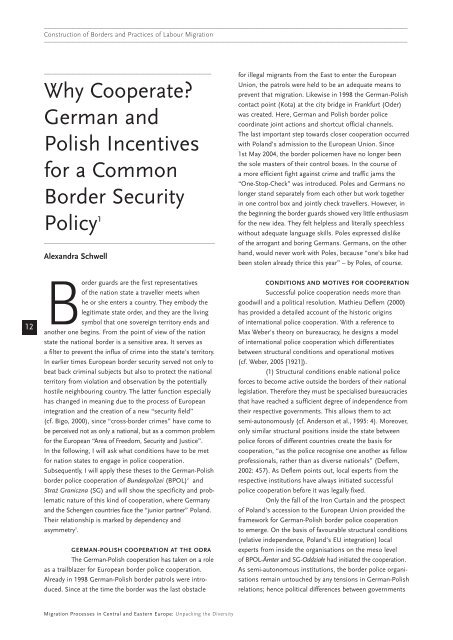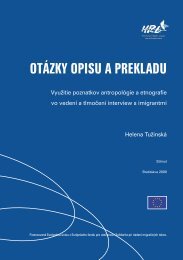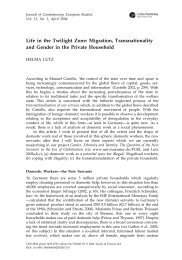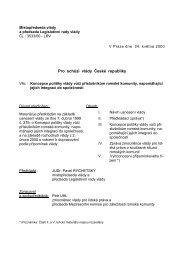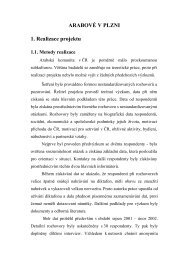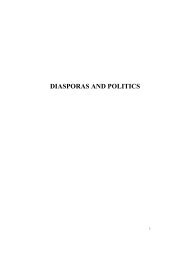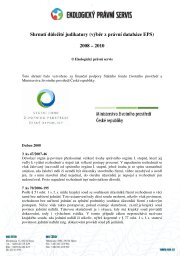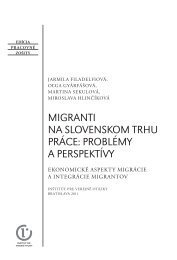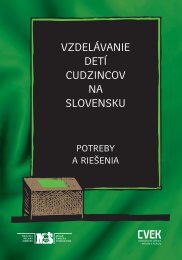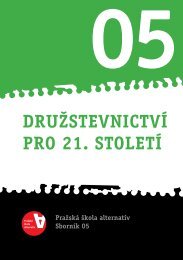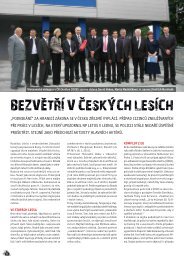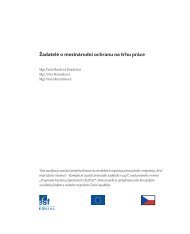Migration Processes in Central and Eastern Europe - Multiple Choices
Migration Processes in Central and Eastern Europe - Multiple Choices
Migration Processes in Central and Eastern Europe - Multiple Choices
You also want an ePaper? Increase the reach of your titles
YUMPU automatically turns print PDFs into web optimized ePapers that Google loves.
———————————————————————————————————————————————————————————————<br />
Construction of Borders <strong>and</strong> Practices of Labour <strong>Migration</strong><br />
———————————————————————————————————————————————————————————————<br />
—————————————————————————————<br />
Why Cooperate?<br />
German <strong>and</strong><br />
Polish Incentives<br />
for a Common<br />
Border Security<br />
Policy 1<br />
—————————————————————————————<br />
Alex<strong>and</strong>ra Schwell<br />
for illegal migrants from the East to enter the <strong>Europe</strong>an<br />
Union, the patrols were held to be an adequate means to<br />
prevent that migration. Likewise <strong>in</strong> 1998 the German-Polish<br />
contact po<strong>in</strong>t (Kota) at the city bridge <strong>in</strong> Frankfurt (Oder)<br />
was created. Here, German <strong>and</strong> Polish border police<br />
coord<strong>in</strong>ate jo<strong>in</strong>t actions <strong>and</strong> shortcut official channels.<br />
The last important step towards closer cooperation occurred<br />
with Pol<strong>and</strong>'s admission to the <strong>Europe</strong>an Union. S<strong>in</strong>ce<br />
1st May 2004, the border policemen have no longer been<br />
the sole masters of their control boxes. In the course of<br />
a more efficient fight aga<strong>in</strong>st crime <strong>and</strong> traffic jams the<br />
“One-Stop-Check” was <strong>in</strong>troduced. Poles <strong>and</strong> Germans no<br />
longer st<strong>and</strong> separately from each other but work together<br />
<strong>in</strong> one control box <strong>and</strong> jo<strong>in</strong>tly check travellers. However, <strong>in</strong><br />
the beg<strong>in</strong>n<strong>in</strong>g the border guards showed very little enthusiasm<br />
for the new idea. They felt helpless <strong>and</strong> literally speechless<br />
without adequate language skills. Poles expressed dislike<br />
of the arrogant <strong>and</strong> bor<strong>in</strong>g Germans. Germans, on the other<br />
h<strong>and</strong>, would never work with Poles, because “one's bike had<br />
been stolen already thrice this year” – by Poles, of course.<br />
12<br />
Border guards are the first representatives<br />
of the nation state a traveller meets when<br />
he or she enters a country. They embody the<br />
legitimate state order, <strong>and</strong> they are the liv<strong>in</strong>g<br />
symbol that one sovereign territory ends <strong>and</strong><br />
another one beg<strong>in</strong>s. From the po<strong>in</strong>t of view of the nation<br />
state the national border is a sensitive area. It serves as<br />
a filter to prevent the <strong>in</strong>flux of crime <strong>in</strong>to the state's territory.<br />
In earlier times <strong>Europe</strong>an border security served not only to<br />
beat back crim<strong>in</strong>al subjects but also to protect the national<br />
territory from violation <strong>and</strong> observation by the potentially<br />
hostile neighbour<strong>in</strong>g country. The latter function especially<br />
has changed <strong>in</strong> mean<strong>in</strong>g due to the process of <strong>Europe</strong>an<br />
<strong>in</strong>tegration <strong>and</strong> the creation of a new “security field”<br />
(cf. Bigo, 2000), s<strong>in</strong>ce “cross-border crimes” have come to<br />
be perceived not as only a national, but as a common problem<br />
for the <strong>Europe</strong>an “Area of Freedom, Security <strong>and</strong> Justice”.<br />
In the follow<strong>in</strong>g, I will ask what conditions have to be met<br />
for nation states to engage <strong>in</strong> police cooperation.<br />
Subsequently, I will apply these theses to the German-Polish<br />
border police cooperation of Bundespolizei (BPOL) 2 <strong>and</strong><br />
Straż Graniczna (SG) <strong>and</strong> will show the specificity <strong>and</strong> problematic<br />
nature of this k<strong>in</strong>d of cooperation, where Germany<br />
<strong>and</strong> the Schengen countries face the “junior partner” Pol<strong>and</strong>.<br />
Their relationship is marked by dependency <strong>and</strong><br />
asymmetry 3 .<br />
GERMAN-POLISH COOPERATION AT THE ODRA<br />
The German-Polish cooperation has taken on a role<br />
as a trailblazer for <strong>Europe</strong>an border police cooperation.<br />
Already <strong>in</strong> 1998 German-Polish border patrols were <strong>in</strong>troduced.<br />
S<strong>in</strong>ce at the time the border was the last obstacle<br />
CONDITIONS AND MOTIVES FOR COOPERATION<br />
Successful police cooperation needs more than<br />
goodwill <strong>and</strong> a political resolution. Mathieu Deflem (2000)<br />
has provided a detailed account of the historic orig<strong>in</strong>s<br />
of <strong>in</strong>ternational police cooperation. With a reference to<br />
Max Weber's theory on bureaucracy, he designs a model<br />
of <strong>in</strong>ternational police cooperation which differentiates<br />
between structural conditions <strong>and</strong> operational motives<br />
(cf. Weber, 2005 [1921]).<br />
(1) Structural conditions enable national police<br />
forces to become active outside the borders of their national<br />
legislation. Therefore they must be specialised bureaucracies<br />
that have reached a sufficient degree of <strong>in</strong>dependence from<br />
their respective governments. This allows them to act<br />
semi-autonomously (cf. Anderson et al., 1995: 4). Moreover,<br />
only similar structural positions <strong>in</strong>side the state between<br />
police forces of different countries create the basis for<br />
cooperation, “as the police recognise one another as fellow<br />
professionals, rather than as diverse nationals” (Deflem,<br />
2002: 457). As Deflem po<strong>in</strong>ts out, local experts from the<br />
respective <strong>in</strong>stitutions have always <strong>in</strong>itiated successful<br />
police cooperation before it was legally fixed.<br />
Only the fall of the Iron Curta<strong>in</strong> <strong>and</strong> the prospect<br />
of Pol<strong>and</strong>'s accession to the <strong>Europe</strong>an Union provided the<br />
framework for German-Polish border police cooperation<br />
to emerge. On the basis of favourable structural conditions<br />
(relative <strong>in</strong>dependence, Pol<strong>and</strong>'s EU <strong>in</strong>tegration) local<br />
experts from <strong>in</strong>side the organisations on the meso level<br />
of BPOL-Ämter <strong>and</strong> SG-Oddziałe had <strong>in</strong>itiated the cooperation.<br />
As semi-autonomous <strong>in</strong>stitutions, the border police organisations<br />
rema<strong>in</strong> untouched by any tensions <strong>in</strong> German-Polish<br />
relations; hence political differences between governments<br />
<strong>Migration</strong> <strong>Processes</strong> <strong>in</strong> <strong>Central</strong> <strong>and</strong> <strong>Eastern</strong> <strong>Europe</strong>: Unpack<strong>in</strong>g the Diversity


